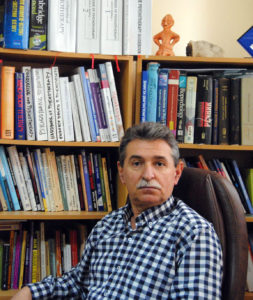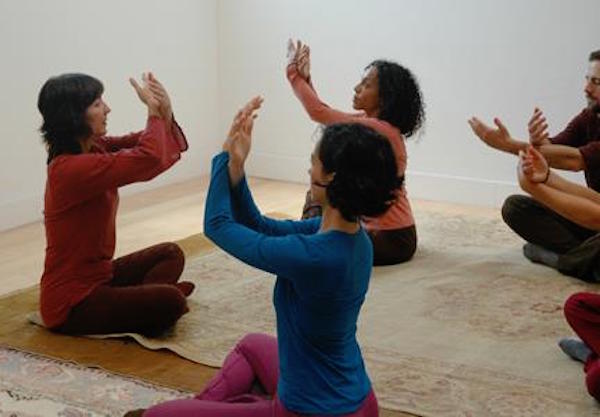Featuring:
“Full Embodiment!—Getting to the Core of Sexuality Trauma” — March 7 & 8, 2017
• What is sexuality trauma in contrast to sexual abuse what forms it
• What is Full Embodiment-goals and intentions, its evolution
• How to begin to work with Sexuality Trauma techniques, (with experiential exercise) science and research– (more experiential)
• How to be an effective practitioner with sexuality issues.
• Further reading and study
 Ariel Giarretto, MS, LMFT is a body-oriented psychotherapist and trauma specialist, with special attention on prenatal, developmental and attachment wounding. Trained in a wide variety of somatic practices, her work is primarily informed by Somatic Experiencing (SE). She is a full-time member of Peter Levine’s international teaching faculty where she trains and mentors professionals worldwide. She develops curriculum and specialty classes for his SE Trauma Institute. In 2005, motivated by the tsunami in Asia, she and 3 other colleagues developed a short-term trauma relief and first aid program for natural disaster survivors. It has since been successfully used in various forms in Thailand, New Orleans, China, Haiti and other countries hit by large scale disasters. She has presented numerous seminars at various medical schools, as well as Santa Rosa Memorial Hospital to the trauma center, focusing on secondary traumatization as well as patient trauma prevention.
Ariel Giarretto, MS, LMFT is a body-oriented psychotherapist and trauma specialist, with special attention on prenatal, developmental and attachment wounding. Trained in a wide variety of somatic practices, her work is primarily informed by Somatic Experiencing (SE). She is a full-time member of Peter Levine’s international teaching faculty where she trains and mentors professionals worldwide. She develops curriculum and specialty classes for his SE Trauma Institute. In 2005, motivated by the tsunami in Asia, she and 3 other colleagues developed a short-term trauma relief and first aid program for natural disaster survivors. It has since been successfully used in various forms in Thailand, New Orleans, China, Haiti and other countries hit by large scale disasters. She has presented numerous seminars at various medical schools, as well as Santa Rosa Memorial Hospital to the trauma center, focusing on secondary traumatization as well as patient trauma prevention.
For 11 years she was on staff at the Esalen Institute in Big Sur, CA, as a workshop and group leader, a therapist for the staff, and an active member of the bodywork and massage crew. Trained as a First Responder, Ms Giarretto was a volunteer firefighter, and part of the emergency medical response team in the Ventana Wilderness. She has special training with Ray Castellino in prenatal and birth therapy, and has been a homebirth advocate, a “doula” and childbirth educator. She is based in the San Francisco Bay Area where she maintains a private practice and supports SE students in integrating the SE skills into their practices. http://www.fullembodiment.org
The Dragon in The Bedroom: A Couple’s Approach to Healing Sexual Wounds and Trauma – March 15, 2017
It is estimated that one in ten children are survivors of some form of sexual abuse. While many of these children grow up to have satisfying sex lives, others carry their abuse into their future relationships. They may avoid sex, or certain sexual activities, to avoid being overtaken by painful and confusing feelings. Those with unresolved sexual wounds may also feel shame for not being able to perform like “normal” people do.
In committed relationships, the legacy of sexual trauma is a couple’s issue. Both partners are at risk of feeling injured, unloved and blamed for difficulties in the bedroom. Instead of connecting around their fears, many partners put a wall up or try to exile their painful emotions with limited success. Others become excessively cautious about triggering their partner. This webinar will present an approach that positions the couple as an “Erotic team,” empowering them to embrace sexual challenges in a cooperative and mindful way.
In this webinar, you will:
Learn a simple 4-step method for helping couples when they get triggered.
Understand how mindfulness can differentiate “then” from “now” to lower activation and support healing.
Help couples reorient from performance to pleasure, regardless of “functionality”.
Teach couples how to rely on their felt sense to establish context-specific boundaries rather than one-size-fits-all rules.
 Maci Daye, LPC, she is a Licensed Professional Counselor and Certified Sex Therapist located in Decatur, Georgia and Mallorca, Spain. She has more than 25 years experience in social service, higher education and private practice settings. She holds a graduate degree from Harvard and Georgia State Universities and completed the Level 2 Somatic Experiencing training.
Maci Daye, LPC, she is a Licensed Professional Counselor and Certified Sex Therapist located in Decatur, Georgia and Mallorca, Spain. She has more than 25 years experience in social service, higher education and private practice settings. She holds a graduate degree from Harvard and Georgia State Universities and completed the Level 2 Somatic Experiencing training.
In addition to her clinical practice, she is on the faculty of the Hakomi Institute and has presented at numerous conferences. She was one of the highly sought after workshops at the USABP Conference in 2016. She is the creator of Passion and Presence® mindful sexuality retreats for couples. Maci has led professional trainings and couples retreats in the USA, Mexico, Australia, New Zealand and Europe.
Sexual Disorders and Body Psychotherapy – March 22, 2017
Sexuality is vital process in human life. Sexual activities brings sexual disorders, sexual disorders presents in sexual activities. Many sexual disorders are treating very successfully with using the body psychotherapy approach where are integrating body-mind and emotions.
Most common sexual disorders
Some of the common sexual difficulties include: loss of libido or desire for sex, lack of sexual enjoyment, pain experienced during sexual behavior such as vaginismus, vulvadynia, difficulty experiencing orgasm, fear of sex, body image issues related to sexual intimacy, erectile difficulties, such as rapid or delayed ejaculation, compulsive sexual behaviors, sex and porn addictions, performance anxiety, mismatched sex drives in a relationship, and/or differences in sexual preferences.
How Body Psychotherapy techniques can help?
The essential work in treatment of sexual disorders is to identify the roots of causes the sexual disorders and then to prepare the operative plan of treat with appropriate techniques and methods where are involved mind, body, emotions and behaviors.
The most popular techniques used in Body Psychotherapy are breathing techniques, Kegel Exercises, body mind techniques, and special massage techniques. The focus is on the whole as a person by using his and/or her existing capabilities. Every human being has by nature two main capabilities; capability to know and capability to love. By using these two capabilities everyone have possibilities to change and develop his state.
In my 20 years of experiences with veganism problems, I am using the seven phases in treatment; a) isometric exercises, where partners are doing warm up exercises, b) Kegel exercises using the breathing techniques, c) finger press insertion techniques, d) mutual whole body meditative massage, e) pre-intercourse insertion meditative massage technique, f) imaginative full intercourse meditative massage, and g) finding the adequate intercourse positions and readiness for sexual act.
What are the benefits by applying the Body Psychotherapy techniques?
Using the specific techniques from Body Psychotherapy approach may bring attention to the central point where the patient has to see as a whole person but not as person with disorder;
It is not important what and how patient is thinking, but also what is feeling and how he/she understands the expression of own feelings;
By the nature every human being is good, there for every human being has two kind of capabilities; capability to know and capability to love. Making awareness of own capabilities is a crucial focus in integration of body mind techniques in treating the sexual disorders;
Medicines(pills) are not useful if the problems are pure psychological, wide spectrum of techniques from holistic psychotherapy approaches are more effective, cheap and not contraindicative.
 Prof. Mag. Sci. Enver Cesko, (Kosovo), Mag. Science in Psychology, Pedagogy and Psychotherapy. President of the Kosovo Association for Psychotherapy – KAP, Prishtina. A member of the World Council for Psychotherapy – WCP, since 1997; member of the European Association for Psychotherapy – EAP, since 1998; member of the International Center for Positive Psychotherapy – ICPP, since 2000; members of the European Association for Body Psychotherapy – EABP, 2001; Member of European Studies for Stress and Trauma – ETSS, since 2003; Board member Asian Association for Psychotherapy – BAAP, since 2004. He is also a psychotherapist founder of the Association of Kosovo – KAP and also the Chairman since 2002; Psychiatrists member of Kosovo Asocioacionit -APK, 2004; at the same time the founder and director of the Kosovo Centre for Positive Psychotherapy 2005; and founder and director of the Kosovar Association of Body Psychotherapy / Integrative Body-Mind Center, since 2007.
Prof. Mag. Sci. Enver Cesko, (Kosovo), Mag. Science in Psychology, Pedagogy and Psychotherapy. President of the Kosovo Association for Psychotherapy – KAP, Prishtina. A member of the World Council for Psychotherapy – WCP, since 1997; member of the European Association for Psychotherapy – EAP, since 1998; member of the International Center for Positive Psychotherapy – ICPP, since 2000; members of the European Association for Body Psychotherapy – EABP, 2001; Member of European Studies for Stress and Trauma – ETSS, since 2003; Board member Asian Association for Psychotherapy – BAAP, since 2004. He is also a psychotherapist founder of the Association of Kosovo – KAP and also the Chairman since 2002; Psychiatrists member of Kosovo Asocioacionit -APK, 2004; at the same time the founder and director of the Kosovo Centre for Positive Psychotherapy 2005; and founder and director of the Kosovar Association of Body Psychotherapy / Integrative Body-Mind Center, since 2007.
He has participated in many World Congress for Psychotherapy and most of them had presentations.
 Linda Ciotola is a Certified TEP: trainer-educator-practitioner of psychodrama, group psychotherapy, and sociometry; and an accredited Certified Trainer in the Therapeutic Spiral Model ™ of psychodrama used specifically for working with trauma survivors. She is Co-Leader and Developer of the Therapeutic Spiral Bodyworkshop specifically designed for healing body-based trauma issues and a Certified Health Education Specialist (Ret.) with 45 years experience in education, group facilitation, and lifestyle counseling. Linda holds ACE (American Council on Exercise) certifications as a Personal Trainer, Fitness and Yoga Instructor, Health Coach and MINDBODY Specialist. She was honored in 2008 with the Zerka Moreno Award for outstanding contributions to the field of Psychodrama. She is co-author with Karen Carnabucci of Healing Eating Disorders with Psychodrama and Other Action Methods – Beyond the Silence and the Fury. She presents widely at regional, national and international conferences.
Linda Ciotola is a Certified TEP: trainer-educator-practitioner of psychodrama, group psychotherapy, and sociometry; and an accredited Certified Trainer in the Therapeutic Spiral Model ™ of psychodrama used specifically for working with trauma survivors. She is Co-Leader and Developer of the Therapeutic Spiral Bodyworkshop specifically designed for healing body-based trauma issues and a Certified Health Education Specialist (Ret.) with 45 years experience in education, group facilitation, and lifestyle counseling. Linda holds ACE (American Council on Exercise) certifications as a Personal Trainer, Fitness and Yoga Instructor, Health Coach and MINDBODY Specialist. She was honored in 2008 with the Zerka Moreno Award for outstanding contributions to the field of Psychodrama. She is co-author with Karen Carnabucci of Healing Eating Disorders with Psychodrama and Other Action Methods – Beyond the Silence and the Fury. She presents widely at regional, national and international conferences.
 Ariel Giarretto, MS, LMFT is a body-oriented psychotherapist and trauma specialist, with special attention on prenatal, developmental and attachment wounding. Trained in a wide variety of somatic practices, her work is primarily informed by Somatic Experiencing (SE). She is a full-time member of Peter Levine’s international teaching faculty where she trains and mentors professionals worldwide. She develops curriculum and specialty classes for his SE Trauma Institute. In 2005, motivated by the tsunami in Asia, she and 3 other colleagues developed a short-term trauma relief and first aid program for natural disaster survivors. It has since been successfully used in various forms in Thailand, New Orleans, China, Haiti and other countries hit by large scale disasters. She has presented numerous seminars at various medical schools, as well as Santa Rosa Memorial Hospital to the trauma center, focusing on secondary traumatization as well as patient trauma prevention.
Ariel Giarretto, MS, LMFT is a body-oriented psychotherapist and trauma specialist, with special attention on prenatal, developmental and attachment wounding. Trained in a wide variety of somatic practices, her work is primarily informed by Somatic Experiencing (SE). She is a full-time member of Peter Levine’s international teaching faculty where she trains and mentors professionals worldwide. She develops curriculum and specialty classes for his SE Trauma Institute. In 2005, motivated by the tsunami in Asia, she and 3 other colleagues developed a short-term trauma relief and first aid program for natural disaster survivors. It has since been successfully used in various forms in Thailand, New Orleans, China, Haiti and other countries hit by large scale disasters. She has presented numerous seminars at various medical schools, as well as Santa Rosa Memorial Hospital to the trauma center, focusing on secondary traumatization as well as patient trauma prevention. Maci Daye, LPC, she is a Licensed Professional Counselor and Certified Sex Therapist located in Decatur, Georgia and Mallorca, Spain. She has more than 25 years experience in social service, higher education and private practice settings. She holds a graduate degree from Harvard and Georgia State Universities and completed the Level 2 Somatic Experiencing training.
Maci Daye, LPC, she is a Licensed Professional Counselor and Certified Sex Therapist located in Decatur, Georgia and Mallorca, Spain. She has more than 25 years experience in social service, higher education and private practice settings. She holds a graduate degree from Harvard and Georgia State Universities and completed the Level 2 Somatic Experiencing training. Prof. Mag. Sci. Enver Cesko, (Kosovo), Mag. Science in Psychology, Pedagogy and Psychotherapy. President of the Kosovo Association for Psychotherapy – KAP, Prishtina. A member of the World Council for Psychotherapy – WCP, since 1997; member of the European Association for Psychotherapy – EAP, since 1998; member of the International Center for Positive Psychotherapy – ICPP, since 2000; members of the European Association for Body Psychotherapy – EABP, 2001; Member of European Studies for Stress and Trauma – ETSS, since 2003; Board member Asian Association for Psychotherapy – BAAP, since 2004. He is also a psychotherapist founder of the Association of Kosovo – KAP and also the Chairman since 2002; Psychiatrists member of Kosovo Asocioacionit -APK, 2004; at the same time the founder and director of the Kosovo Centre for Positive Psychotherapy 2005; and founder and director of the Kosovar Association of Body Psychotherapy / Integrative Body-Mind Center, since 2007.
Prof. Mag. Sci. Enver Cesko, (Kosovo), Mag. Science in Psychology, Pedagogy and Psychotherapy. President of the Kosovo Association for Psychotherapy – KAP, Prishtina. A member of the World Council for Psychotherapy – WCP, since 1997; member of the European Association for Psychotherapy – EAP, since 1998; member of the International Center for Positive Psychotherapy – ICPP, since 2000; members of the European Association for Body Psychotherapy – EABP, 2001; Member of European Studies for Stress and Trauma – ETSS, since 2003; Board member Asian Association for Psychotherapy – BAAP, since 2004. He is also a psychotherapist founder of the Association of Kosovo – KAP and also the Chairman since 2002; Psychiatrists member of Kosovo Asocioacionit -APK, 2004; at the same time the founder and director of the Kosovo Centre for Positive Psychotherapy 2005; and founder and director of the Kosovar Association of Body Psychotherapy / Integrative Body-Mind Center, since 2007.